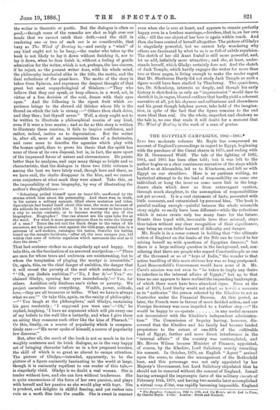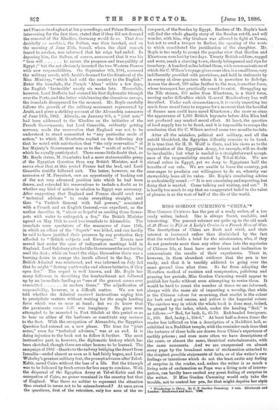THE EGYPTIAN CAMPAIGNS, 1882-1885.*
INTO two moderate volumes Mr. Boyle has compressed an account of England's proceedings in regard to Egypt, beginning with the purchase of the Canal shares in 1875, and ending with Sir H. Drummond Wolff. The tale of the fighting of 1882, 1884, and 1885 has been often told; but it was left to the author to give us a clear continuous narrative of the steps which landed us at Alexandria, led us to Khartoum, and left us with Egypt on our shoulders. Here is no partisan writing, no hysterical attempt to fix the load of responsibility on some one individual, or hang the issue on some mere link in the long- drawn chain which drew us from extravagant caution, through much slaughter, to the assumption of responsibilities not yet avowed. It is a cool statement of facts, presented with little comment, and untarnished by personal bias. The book is painful reading enough—painful because the whole miserable story might so easily have been different—while the reflections which it raises create only too many fears for the fatare. Events thus toyed with, inexorable laws thus misread, steps thus taken without any clear recognition of their significance, may bring an even fuller harvest of difficulty and danger.
Mr. Boyle is in a sense correct in holding that "the ultimate action of England on the banks of the Nile can be traced to her mixing herself up with questions of Egyptian finance ;" but there is a large military question in the background, and, con- sidering that there are people who regard Constantinople as one of the thousand or so of " keys of India," the wonder is that active handling of this more obvious key was so long postponed. Lord Beaconsfield's Government would have none of it. Mr. Cave's mission was not even to " bo taken to imply any desire to interfere iu the internal affairs of Egypt ;" but up to that time no one appears to have realised the impending bankruptcy, of which there must have been abundant signs. Even at the end of 1876, Lord Derby would not adopt so heroic a measure as to " authorise " the person selected by the Khedive to act as Controller under the Financial Decrees. At this period, as later, the French were in favour of more decided action, and our Foreign Secretary was soon impelled to a further step :—" He
would be happy to co-operate in any useful measure not inconsistent with the Khedive's independent administra- tion." The Commission of Inquiry having, however, dis- covered that the Khedive and his family had become landed proprietors to the extent of one-fifth of the cultivable land of Egypt, further and more direct interference in the "internal affairs" of the country was contemplated, and Mr. Rivers Wilson became Minister of Finance, appointed, of course, by the Khedive, Lord Salisbury merely recording his consent. In October, 1878, an English " Agent " arrived upon the scene, to share the management of the Rothschild loan, and this personage was not only appointed by her Majesty's Government, but Lord Salisbury stipulated that he should not be removed without the consent of England. Ismail having arranged the impromptu farce of the military entente of February 18th, 1879, and having two months later accomplished a virtual coup d'gtat, was rapidly becoming impossible. England • The Egyptian Campaisns. 1882 to 1E85, and the Events wh'oh Led to Them. By Charles Hoyle. 2 vols. London : Burst and Blaokett.
and France stood aghast at his proceedings, and Prince Bismarck, intervening for the first time, stated that if they did not demand the removal of the Khedive, Germany would do so. That deus decidedly as machinti, the Sultan, was then invoked, and on the morning of June 25th, Ismail, whom the chief eunuch feared to awaken, was informed that his reign had ended. In deposing him, the Sultan, of course, announced that it was his
"firm will to secure the progress and tranquillity of Egypt ;" but the act obviously invested the two Western Powers with new responsibilities. On September 9th, 1881, occurred the military revolt, with Arabi's demand for the dismissal of the Riaz Ministry, " which had sold the country to the English." Enter the ironclads, the French r Alma' within a few days, the English `Invincible' nearly six weeks late. Meanwhile, however, Lord Dufferin had secured his first diplomatic triumph over the Porte, and the latter withdrawing the obnoxious envoys, the ironclads disappeared for the moment. Mr. Boyle carefully follows the growth of the military movement represented by Arabi, and gives a striking account of the Alexandria massacres of Jane 11th, 1882. Already, on January 8th, a "joint note" had been addressed to the Khedive on the initiative of the French Government; but Lord Granville, evidently getting nervous, made the reservation that England was not to be understood to stand committed to "any particular mode of action," to which M. Gambetta replied on the following day that he noted with satisfaction that "the only reservation" of her Majesty's Government was as to the " mode of action," in which he equally participated. There seems little doubt that, as Mr. Boyle states, M. Gambetta had a more statesmanlike grasp of the Egyptian Question than any British Minister, and it seems clear that at this period France had the lead, and Lord Granville timidly followed suit. The latter, however, on the accession of M. Freycinet, saw an opportunity of backing out of the not very advanced position into which he had been drawn, and extended his reservations to include a doubt as to whether any kind of action in relation to Egypt was necessary. After suggesting that England and France should send two " technical advisers " to make everything straight, and then "a Turkish General with full powers," associated with a French and an English General,—an expedient, as the author describes it, " about as hopeful as sending three flower- pots with water to extinguish a fire," the British Minister agreed on May 11th to send two ironclads to Alexandria. The ironclads were spectators of the massacres of June 11th, in which an officer of the Superb' was killed, and can hardly be said to have justified their presence by any protection they afforded to "British subjects and Europeans." Events now moved fast under the spur of indignation meetings held in England. Lord Salisbury attacked the Government for not having need the fleet ; while on board the ships themselves there was a burning desire to avenge the insult offered to the flag. The British Admiral was reinforced, and was informed on July 3rd that he might "destroy earthworks and silence batteries, if they open fire." The sequel is well known, and Mr. Boyle has many followers in describing the bombardment not followed up by an immediate landing as "one of the gravest errors ever
committed in modern times." The adjudication of
responsibility, however, is a difficult matter. We are not told whether the Admiral received instructions urging him to precipitate matters without waiting for the ample landing force which was so near at hand ; but we do know that the proximate casus Belli was imaginary. No guns were attempted to be mounted in Fort Silsileh at this period so as to bear on either of the harbours or constitute any menace to the fleet. With the occupation of Alexandria, the Egyptian Question had entered on a new phase. The time for "joint notes," even for "technical advisers," was at an end. It is doing injustice to the book not to follow it further. The most instructive part is, however, the diplomatic history which has been sketched, though there are other lessons to be learned. The campaign of 1882—thanks to the rail way bridging the desert from Ismailia—ended almost as soon as it had fairly begun, and Lord Wolseley's greatest military feat, the prompt advance after Tel- el- Kebir, saved Cairo without the loss of a life. But the triumph was to be followed by fresh errors far less easy to condone. With the dispersal of the Egyptian Army at Tel-el-Kebir and the occupation of Cairo, no power remained in the country but that of England. Was there no soldier to represent the situation thus created in terms not to be misunderstood P At once arose the questions, first of the retention, only too soon of the re-
conquest, of the Soudan by Egypt. Readers of Mr. Royle's book will find the whole ghastly story of the Soudan retold, and will wonder, with him, why Graham was allowed to fight at Tamai, but not to send a trooper to Berber, the opening of the route to which constituted the justification of the slaughter. Mr. Boyle is too ready to accept the popular view that Gordon and Khartoum were lost by two days. Twenty British soldiers, ragged and worn, reach a starving town, closely beleaguered and ripe for treachery. A hundred miles behind them, with communications of which Sir C. Wilson's voyage gives some idea, is a small force, very indifferently provided with provisions, and held in stalemate by an enemy at close quarters whom it is powerless to dislodge. Across the desert, 180 miles further to the rear, is another force, whose transport has practically ceased to exist. Struggling up the Nile stream, 350 miles from Khartoum, is a third force, moving under difficulties which General Brackenbury has well described. Under such circumstances, it is surely expecting too much from moral force to suppose for a moment that the handful of Sussex men could have saved Khartoum ; the more so since the appearance of 1,500 British bayonets before Abu Klea had not produced any marked moral effect. At least, the question of food supply has to be faced, and it is impossible to escape the conclusion that Sir C. Wilson arrived some two months too late.
After all the mistakes, political and military, and all the untold bloodshed, the Egyptian difficulty remains to be faced. It is true that Sir H. D. Wolff is there, and his views as to the organisation of the Egyptian Army, for example, will no doubt be invaluable ; but what is needed is a straightforward accept- ance of the responsibility created by Tel-el-Kebir. We are virtual rulers in Egypt, yet we deny to Egyptians half the benefits of our rule. We are unable to leave the country, yet over-eager to proclaim our willingness to do so, whereby our stewardship loses all its value. Mr. Royle's concluding advice is undoubtedly sound :—" It is not examining and reporting, but doing that is wanted. Cease talking and writing, and act." It is hardly too much to say that an exaggerated belief in the value of phrases is at the root of half of the ills of the world.





































 Previous page
Previous page